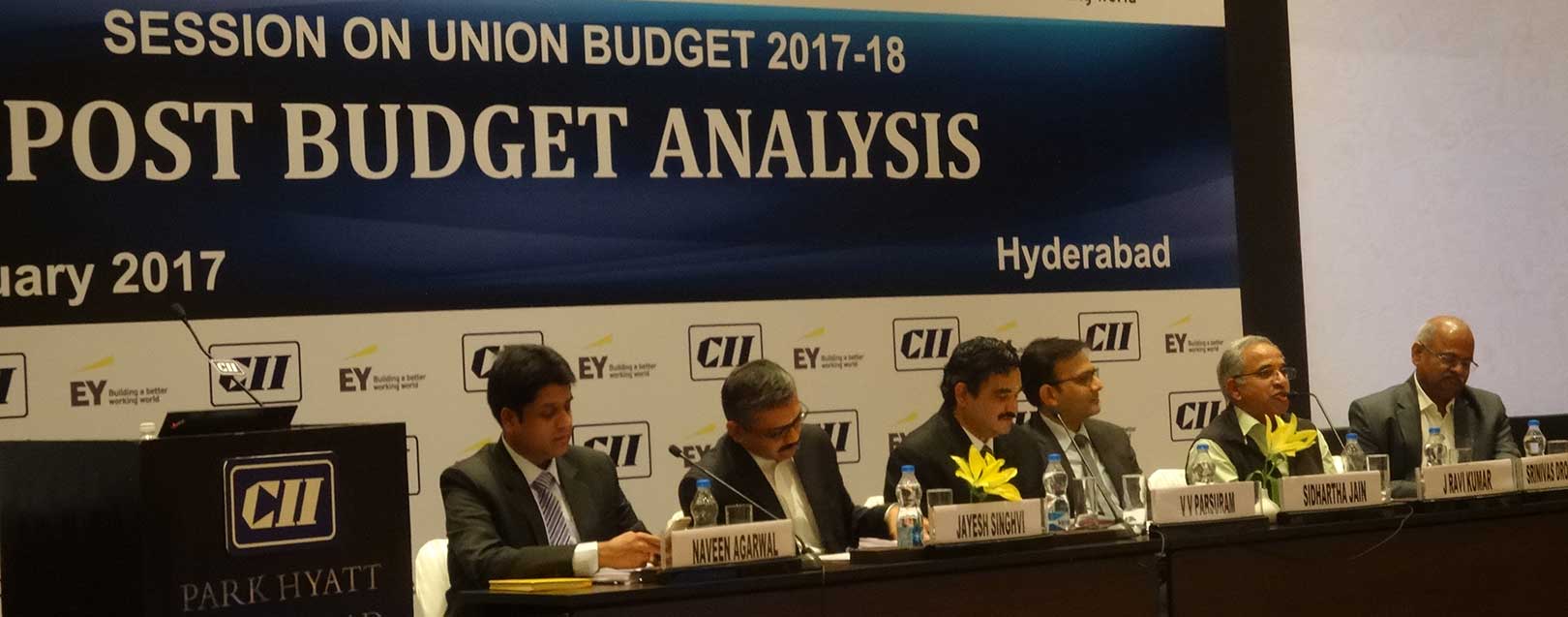
Budget impact on banking and infrastructure sector
Sneha Gilada
At a post-Budget discussion hosted jointly by Confederation of Indian Industry (CII) and Ernst & Young (EY), industry experts gave their insights on the sector-wise impact of Budget 2017. Following are exclusive bits from CII-EY Budget Connect:
Jayesh Singhvi, Partner, Ernst & Young Services Pvt Ltd:
Giving an overall positive view of the Budget, Jayesh said that the government is showing that it means business. "This Budget is a continuation of the steadfast direction that the government has consistently followed for three years."
Jayesh applauded the commendable 17% year on year growth in tax revenue for two years consecutively. "The fact that the target for tax revenue growth in 2017-18 is set at 12%, speaks volumes about the Centre's conservative approach towards projections," he said.
Speaking of the uniqueness of NDA, Jayesh said, "What's different about this government is that it is willing to listen and implement, which is a big leap forward. Also, unlike never before, there is a quick, speedy response to industry concerns." Giving an example, he said that the government willingly agreed to defer the Place of Effective Management (PoEM) guidelines, after widespread industry opposition.
Giving an overview of the world economy, Jayesh said that the developed world is intent on cutting corporate taxes to attract private investment and growth. "Amidst US proposing 15% tax and the UK going down to 18%, India is also gradually falling in line by implementing a phased reduction from 30% to 25%. For a developing economy, this is huge."
He widely acknowledged the behavioural changes in the economy brought about by demonetisation and appreciated measures in the budget like a reduced tax for MSMEs and the personal tax rebate for the low-income bracket, which will provide relief to the section of the population that has borne the brunt of demonetisation.
Srinivas Dronamraju, COO, V Soft Corporation, on the banking sector:
"Through schemes and measures boosting Jan Dhan accounts, payments banks, UPI, etc, we see that the government had the note-ban coming for a long time. The government began to introduce digital payment mechanisms like UPI (Unified Payment Interface) in April 2016, which shows that alternative payment methods were being developed in preparation for demonetisation. The transition could have been much more smooth, had the government promoted these modes of payment much more rigorously and had payments banks up and running by November 2016, but implementation was probably compromised due to secrecy concerns."
Speaking of the benefits of demonetisation, he said, "We have seen 26.68 crore Jan Dhan accounts open after demonetisation. An additional 69,000 crores of money has moved into Jan Dhan accounts. About 21 crores of debit cards have been issued. National Payments Corporation, the coordinating agency for UPI payments, has become much more vibrant."
On the short-term negative impact of demonetisation, he said, "There has been an inflow of additional 15 lakh crore funds in the banking sector due to demonetisation. Along with NPAs, this will also reflect in Q3 profits of banks, as the real profitable deployment of these funds can only be expected post-March 2017."
Pointing out the positives for the banking sector in the Budget, Dronamraju said, "Banking sector is saddled with NPAs, which account for 9.1% of total assets. For public sector banks, the stress is almost thrice that of the private sector. Recapitalisation is necessary to address this issue, to which an amount of 10,000 crores has been allocated in this Budget."
"The Budget has also laid ground work for the financial inclusion of 9 crore farmers, who do not have bank accounts, and are currently banking with the Primary Agriculture Cooperative Societies (PACS), extended arms of the cooperative credit structure. Allocation of 1,900 crores to PACs, for their digitisation and inclusion in the core banking system, is a huge step forward. If direct benefit transfers (DBT) concerning farmers can be made to these accounts, then there will also be gains in terms of eliminating middlemen."
"Digitisation in the agricultural sector will also aid collection of data on affected crop-areas and enhance Management Information System (MIS) capability, which will help the government take accurate decisions on loan-waivers."
"Penetration of commercial banks into the rural sector is very poor due to lack of infrastructure and dismal bandwidth. As part of phase one, Bharat Net, which covers one lakh gram panchayats, has laid 150 thousand km of optical fibre. This Budget has an outlay of 10,000 crores for phase two, covering another 150 thousand gram panchayats. It is expected that 250 thousand km of optical fibre cable will be laid by mid-2018. This will enhance connectivity and hence, grow rural banking."
J Ravi Kumar, CFO, L&T Hyderabad Metro Pvt. Ltd, on infrastructure:
Speaking about inefficient implementation, the L&T CFO said, "The Budget is akin to a mission statement of the government. Although high on intent, it is the implementation that is key to the translation of policies into real growth. Infrastructure has gained a lot of importance in the past few years. The PPP model and Kelkar Committee for resolution of disputes in infra projects are examples of initiatives in the sector. But there are loose ends in implementation."
Demanding better dispute resolution mechanisms, he said, "There is a need for introduction of renegotiation in concession agreements, which currently do not have any scope for change. Since there are no independent regulators, the government takes final authority. This is the apple of discord in most disputed PPP projects. One lakh crores of such disputes are pending for clearance from the infra segment."
"The biggest hardship of most infra players comes from highly leveraged balance sheets. Lending has contracted due to NPA issues and interest rates have also soared. This hasn't been addressed in the budget. Unless something is done to revive banking, credit growth cannot take place for infra," he said, about giving infra the much-needed impetus through credit expansion.
"Foreign Investment Promotion Board (FIPB), which was hailed as a quick route for FDI inflows three years ago has died a natural death. While 90% FDI has been shifted to automatic route, the remaining 10% still needs to be addressed after the abolition of FIPB," he added.
"New credit rating system for infra projects announced in this Budget is a welcome step."
"Metro rails are part and parcel of city transformation. There have been Centre-state non-alignment issues in metro rail projects, which are likely to be addressed in the Metro Rail Act introduced in this Budget."
"There are no specific tax sops for infrastructure in this Budget. The service tax exemption made for construction of metro and mono rail two years ago, was withdrawn last year. So, this cancels out the other positives."






 to success.
to success.